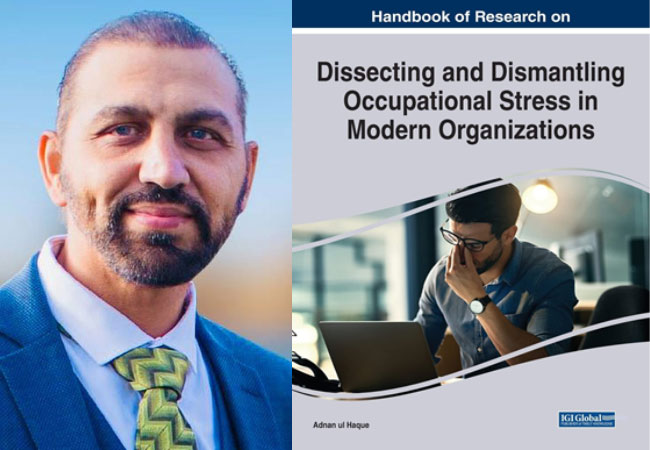Bachelor of Business Administration professor Dr. Adnan ul Haque recently published his second book on occupational stress.
Titled Handbook of Research on Dissecting and Dismantling Occupational Stress in Modern Organization and published by IGI Global, the 559-page text explores key concepts of occupational stress in modern organizations across the globe, such as how stress is felt and dealt with by professionals from various sectors operating in the globalized environment.

“Occupational stress is part of the professional life of personnel working in many different industries across the globe. It is a stress that occurs due to working in an organizational setting, but its impact remains even after office hours end,” Haque said of his impetus for the book, which he edited.
“The physical and mental wellbeing of personnel is vital to organizations and therefore this book aims to dissect and dismantle the stressors at workplaces, exploring the contributing factors interlinked with stressors.”
To those ends, the book also provides an in-depth understanding of the magnitude and reasons behind the varying impacts of stressors within modern organizations.
Covering topics such as health capital, turnover intentions, and work-family conflict, the Handbook of Research on Dissecting and Dismantling Occupational Stress in Modern Organization acts as a resource for business leaders, managers, human resource managers, librarians, government officials, occupational therapists, researchers, academicians, scholars, educators, and students.
“Physical and mental responses to stress vary in terms of degree, intensity, and impact. Some professionals in specific sectors experience large amounts of stress as compared to others, and the strategies to cope with occupational stresses may also vary from person to person, business to business, and industry to industry,” Haque explained, noting that the COVID-19 pandemic has paved the way to better understanding the importance of mental health and healthiness in the workplace.
“Work ethic, work-life conflict, self-efficacy, self-care, burnout, the digitization of mental health therapy, administrative psychopathy, transformational leadership, depression and anxiety, technostress, intentional awareness, emotional intelligence, and employees’ performance, disabilities, and parenting style are some of the variables that are examined to understand the stressors in various sectors.”
Helping Haque to explore all these themes in Handbook of Research on Dissecting and Dismantling Occupational Stress in Modern Organization are academic contributors from all around the world – including several of Haque’s Yorkville University colleagues.
“This book is an effort to provide practical strategies to combat ongoing stress, therefore, diverse global authors have united on a platform to enhance the existing body of knowledge about stressors, individual capabilities, and organizational behaviour,” he said.
Yorkville University contributors include:
- Vice President Academic Ontario, Dr. Angela Antohi-Kominek, and Dr. Andrew Cutler, Director of General Studies, co-wrote a chapter titled, Work Ethic and Stress: A Reflective Approach on How Work Ethic and Stress Manifest in Diverse Organizational Structures
- Bachelor of Business Administration professor Tania Osman wrote a chapter titled, Work From Home Stress and Burnout
- Master of Arts in Counselling Psychology (MACP) professor Dr. Denisa Millette contributed a chapter entitled Emotional Self-Awareness, Self-Care, and Occupational Stress in Mental Health Professionals
- MACP professor Dr. Rosina Mete wrote a chapter titled, Conquering Mental Health Stigma and Developing Strategies to Reduce Workplace Stress: The CALM Model
- MACP professor Sanaz Adibian wrote a chapter titled, From Stressful Doing to a Joyful Being
- MACP professor Dr. Aaron Smith co-wrote a chapter titled, Rethinking Self-Care in Occupational Stress
- MACP student DaLissa Alzner co-wrote a chapter titled, Administrative Psychopathy: Profiling the Workplace Bully
- Master of Education professor Rupert Collister wrote a chapter titled, A Journeyman Professor’s Experience of Precarity and Meaningful Work
Click here to learn more about Handbook of Research on Dissecting and Dismantling Occupational Stress in Modern Organizations.






